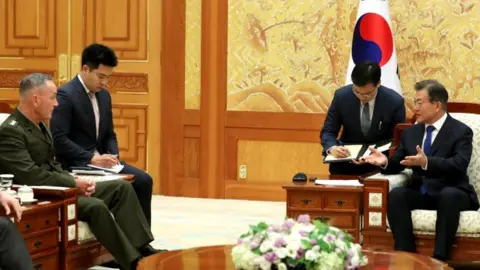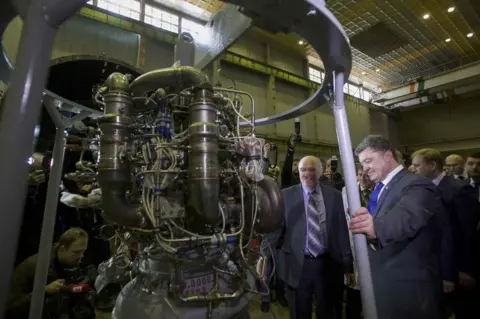North Korea crisis: South's leader in plea to avoid war
 Reuters
ReutersSouth Korean President Moon Jae-in has called on his US ally to help prevent a war, amid worsening tension over the North's nuclear threat.
Mr Moon told the visiting top US military official that there must be a diplomatic solution to the crisis.
Gen Joseph Dunford said the US priority was diplomacy but he added that it was committed to defending the South against a possible military attack.
The North on Monday said any war could "only be turned into a nuclear war".
Also on Monday, China's commerce ministry issued an order banning a slew of imports from North Korea, in line with additional UN sanctions that were announced earlier this month.
The sanctions were introduced in response to a wave of missile tests and increased military rhetoric from North Korea.
In another development, Ukraine has denied supplying North Korea with rocket engines from one of its factories.
A report in the New York Times suggests that Soviet-era engines made at the Yuzhmash factory in Dnipro (the city known until recently as Dnipropetrovsk) were supplied to the North illegally.
 Reuters
Reuters'Calm and responsible'
US President Donald Trump has warned North Korea against threatening the American territory of Guam. The US has 28,500 troops in South Korea.
Speaking on Monday, Mr Moon said: "Our top priority is the national interest of [South Korea] and our national interest lies in peace.
"I am confident that the US will respond to the current situation in a calm and responsible manner in line with our policy direction."
He urged the North to "stop all provocations and hostile rhetoric immediately, instead of worsening the situation any further".
Gen Dunford, chairman of the US Joint Chiefs of Staff, said after meeting Mr Moon that the US sought a peaceful resolution to the crisis with the North.
"Our job is to make sure our leadership has an option available to them," he added, as quoted by South Korea's Yonhap news agency.
"I believe there are two things we are clear about: one, our responsibility to defend against attack, two, our requirement to make sure we have a decisive response in the event of attack."
The US, he said earlier, had "viable military options in the event that the diplomatic and economic pressurisation campaign fails".
The general is due to travel on to China and Japan.
The North's news agency, KCNA, warned on Monday that a conflict could be sparked by "a minor incident".
"The problem is that if the war occurs, it can only be turned into a nuclear war," it said.+
On Sunday, US National Security Adviser HR McMaster said he did not think the sides were closer to war than a week ago, while CIA Director Mike Pompeo said he saw no intelligence to suggest the sides were on the cusp of a nuclear war.
Meanwhile, China has signalled it will halt iron, iron ore and seafood imports from North Korea starting on Tuesday, following the UN resolution on sanctions.

Analysis: Different this time?
John Sudworth, BBC Beijing correspondent
China's announcement today formally incorporates the new tougher sanctions into its customs regulations but then it has signed up to the previous rounds of sanctions, only to be seen to drag its feet.
The big question is whether it's going to be any different this time.
There are signs that the much tougher line coming from Washington is having some effect on Beijing. It has already stopped imports of North Korean coal and the total value of all imports is down compared with this time last year.
But China has said all along that sanctions are for targeting North Korea's weapons programmes, not choking off the wider economy. Total trade, taking into account both imports and exports, has grown this year compared with last.

What are the new sanctions?
 AFP
AFP- Importing coal, seafood, iron and iron ore, lead and lead ore from North Korea is banned
- Countries cannot receive new North Korean workers
- No new joint ventures with North Korean entities or individuals
- No new investment in existing joint ventures
- More individuals targeted with travel bans and assets freezes
- Member states to report to the UN Security Council within 90 days on how they have implemented resolution

